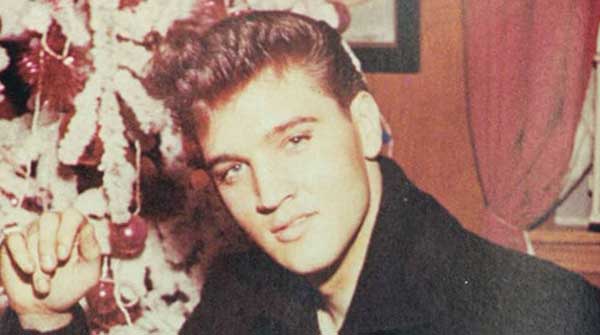 Had he lived, Elvis Presley would be celebrating his 80th birthday this month. If you entered your teens in the second-half of the 1950s, the idea of Elvis being 80 sounds slightly ridiculous. After all, for a brief few years he was the symbol of teenage rebellion and parental dismay. Surely the guy who prompted such intense concerns about the world going to hell in a handbasket couldn’t ever be that old!
Had he lived, Elvis Presley would be celebrating his 80th birthday this month. If you entered your teens in the second-half of the 1950s, the idea of Elvis being 80 sounds slightly ridiculous. After all, for a brief few years he was the symbol of teenage rebellion and parental dismay. Surely the guy who prompted such intense concerns about the world going to hell in a handbasket couldn’t ever be that old!
To start at the beginning, Elvis arrived in circumstances that weren’t particularly promising. Born in Tupelo, Mississippi, in the early morning of January 8, 1935, he was immediately preceded by a stillborn twin brother. Further, the Presleys weren’t exactly flush – the doctor’s $15 fee had to be picked-up by the welfare department. But by his 21st birthday, he was en route to becoming one of the most famous people on the planet.
When he first burst on the scene, Elvis was, well, exotic. For one thing, there was the name. Pop singers like Johnnie Ray or Frankie Laine had names that might correspond to those of people you went to school with. But who had ever heard of an Elvis Presley?
Then there was his appearance. Whereas American personalities sometimes went in for colourful clothes – think Bing Crosby and his Hawaiian shirts – Elvis’ garish outfits were another thing entirely. And when combined with the upturned collar, well-greased ducktail haircut and lush sideburns, there was a touch of something that parents instinctively knew they didn’t like. In Dublin, young men who affected that look were called Teddy Boys, and considered prime candidates for the remedial benefits of military service.
As for the music, it sounded very different to what’d been hitherto available on popular radio. Genre-wise, it was an amalgam of white rockabilly, black rhythm ‘n’ blues and southern gospel, all leavened by a nod to mainstream pop. Vocally, while unmistakably male, his early work had a distinct feline quality.
And sometimes what he did with a cherished song drove older people to distraction. For instance, his 1957 rendering of White Christmas – the arrangement for which was nicked from an earlier version by the Drifters – was considered a desecration of a treasured Bing Crosby classic.
There was also the matter of sex. Although sex appeal had always been a critical element in popular entertainment, Elvis considerably upped the ante. Where the youthful Sinatra had been subtle, Elvis and his vigorously rotating pelvis brooked no ambiguity. Today’s gyrating twerkers may make him look comparatively tame, but things were very different in the 1950s.
Of course, if you unpack the various components, much of the Elvis persona takes on a somewhat derivative look. Marlon Brando and James Dean got there first with the moody bit. Tony Curtis preceded him with the ducktail. In fact, he wasn’t even the first big name rock ‘n’ roller, that distinction belonging to the unlikely – and prematurely middle-aged – Bill Haley.
Indeed, when it comes to songs that we invariably associate with Elvis, a surprising number weren’t his to begin with. Take, for instance, Blue Suede Shoes. While it’s now considered a signature Presley anthem, the original hit belonged to the guy who wrote it, Carl Perkins. By the time Elvis recorded it, the Perkins rockabilly version was already on its way to selling a million.
Still, none of these caveats detract from his initial impact. The way he pulled it all together was genuinely unique. And in addition to inspiring a whole lot of wannabes, he quickly became the dominant youth figure in late 1950s popular culture, a bona fide international phenomenon in an era where media was much less pervasive than it is today.
In addition, he could genuinely sing. His early style may have grated on older ears, but it was truly distinctive. Biographer Peter Guralnick imagined it this way: “In his mind he hears the song differently; it is less florid at times, less like the Irish tenor John McCormack on the sentimental songs, more dramatic on the hillbilly ones.”
Finally, ponder this. While Elvis was never overtly political, he was intensely patriotic and privately disdainful of the counter-culture. And he was also very much a white southern male. Thus, if he was alive today, Elvis would very likely be a Republican.
Now there’s a subversive thought.
Pat Murphy casts a history buff’s eye at the goings-on in our world. Never cynical – well perhaps a little bit.
The views, opinions and positions expressed by columnists and contributors are the author’s alone. They do not inherently or expressly reflect the views, opinions and/or positions of our publication.


